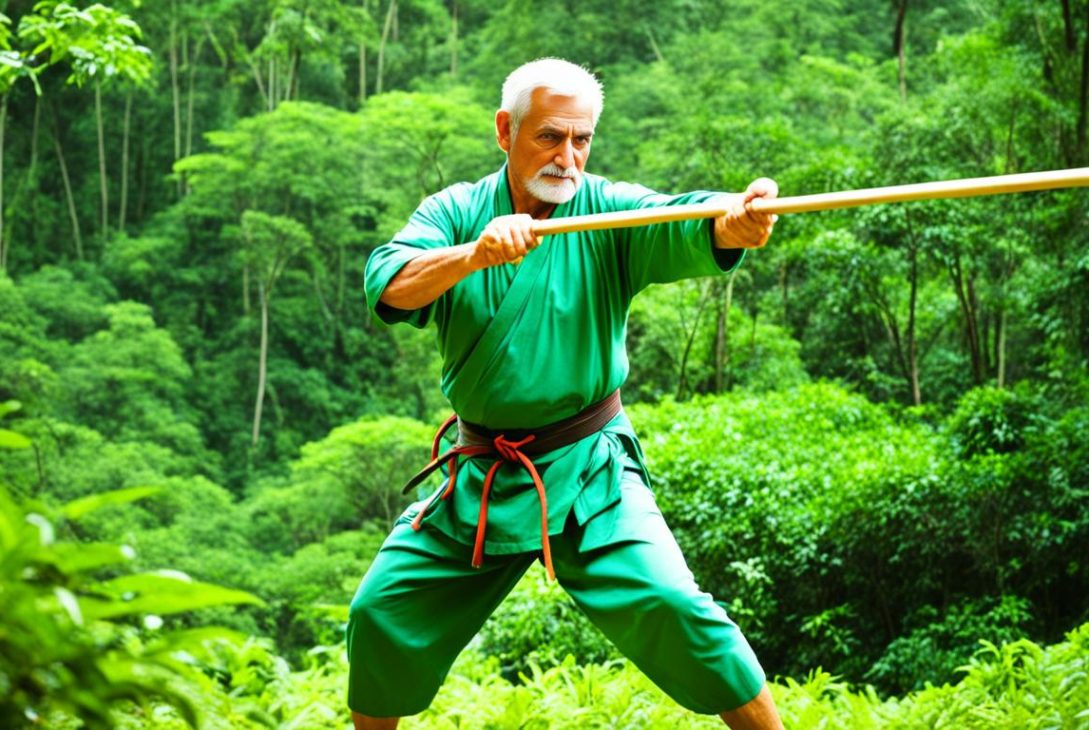Butthan is a unique martial art and combat sport that originates from Bangladesh, with its roots deeply embedded in South Asian heritage. It is more than just a self-defense system; Butthan aims to create balance and harmony in all aspects of an individual’s life. By combining physical techniques, mental strength, emotional awareness, and spiritual growth, practitioners of Butthan strive for self-actualization and personal development.
Key Takeaways:
- Butthan is a Bangladeshi martial art with a rich history and philosophy.
- It focuses on self-defense, personal development, and spiritual growth.
- Butthan combines physical techniques with mental, emotional, and spiritual aspects.
- Practitioners aim for self-actualization and the attainment of true freedom.
- Butthan incorporates scientific principles and knowledge from various disciplines.
The Origin and History of Butthan
Butthan, a martial art with deep roots in ancient Bangladesh and Asia, draws inspiration from traditional Bangladeshi martial arts such as ‘Lathi Khela’ and Burmese martial art ‘Bando’. This unique martial art system was founded by Grandmaster Acharya Mak Yuree Vajramunee, who acquired his skills and knowledge from esteemed grandmasters in Bangladesh, including the renowned Lathi Khela Ustadh Md. Sirajul Haque Chowdhury.
Butthan not only incorporates techniques from these martial arts but also integrates ancient Bangladeshi traditions into its attire, weaponry, rituals, and music, paying homage to its cultural heritage. Furthermore, the roots of Butthan reach back to the Indian sub-continent, where martial arts have been developed and nurtured for centuries.
To learn more about the origin and history of Butthan, let’s take a closer look at its influences and the founder who shaped this martial art system.
Influences from Traditional Bangladeshi Martial Arts
Butthan takes inspiration from traditional Bangladeshi martial arts forms, such as ‘Lathi Khela.’ ‘Lathi Khela’ is a stick-fighting martial art that has been practiced in Bangladesh for centuries. By incorporating elements of ‘Lathi Khela’ into their training, Butthan practitioners learn to effectively defend themselves using various techniques involving long sticks.
The Influence of Burmese Martial Art ‘Bando’
Butthan also draws influences from the Burmese martial art known as ‘Bando.’ ‘Bando’ emphasizes a wide range of techniques, including strikes, kicks, throws, joint locks, and weapon-based combat. By incorporating aspects of ‘Bando’ into the art of Butthan, practitioners expand their arsenal of self-defense techniques and gain a deeper understanding of combat strategies.
The Founder of Butthan: Grandmaster Acharya Mak Yuree Vajramunee
Grandmaster Acharya Mak Yuree Vajramunee, the esteemed founder of Butthan, played a crucial role in shaping and developing this martial art system. His dedication, passion, and commitment to martial arts led him to learn from various grandmasters in Bangladesh, including the highly respected Lathi Khela Ustadh Md. Sirajul Haque Chowdhury.
“Butthan is a unique martial art system that integrates the rich traditions of Bangladesh and draws inspiration from ancient martial arts forms. Through Butthan, we aim to preserve our cultural heritage and provide a comprehensive self-defense and personal development system.” – Grandmaster Acharya Mak Yuree Vajramunee
Grandmaster Acharya Mak Yuree Vajramunee’s expertise in martial arts, combined with his knowledge of traditional Bangladeshi martial arts, laid the foundation for the development of Butthan. His vision was to create a martial art system that not only focuses on self-defense but also nurtures personal growth, physical fitness, and spiritual development.
The journey of Butthan as a martial art system is deeply connected to the roots and heritage of Bangladesh and the rich martial arts history of the Indian sub-continent. By embracing these influences, Butthan continues to evolve and thrive, providing practitioners with a unique martial arts experience.
The Philosophy and Philosophy of Butthan
The philosophy of Butthan is centered around self-actualization, personal development, and pushing one’s limits. Through its training, Butthan emphasizes cooperation, empathy, positive motivation, and personal growth. The goal of Butthan is to transform individuals both physically and mentally, helping them attain self-knowledge and true freedom.
Butthan training encompasses the development of physical, mental, emotional, and spiritual aspects. By incorporating various techniques and practices, Butthan aims to bring about balance and self-mastery in its practitioners. The training goes beyond physical skills and encompasses a holistic approach to personal growth.
One unique aspect of Butthan is its co-competition system. This system promotes values like cooperation, nobility, and a true sense of humanity. Rather than focusing solely on sportsmanship and winning against opponents, Butthan encourages practitioners to work together and support each other’s growth.
The Benefits of Butthan
Training in Butthan offers numerous benefits to practitioners. Here are some of the key advantages:
- Improved physical fitness and strength
- Enhanced mental focus and concentration
- Better emotional well-being and self-awareness
- Increase in self-confidence and self-esteem
- Development of discipline and self-control
- Stress reduction and inner peace
Through its philosophy and training methods, Butthan provides individuals with a path towards personal growth, self-improvement, and a deeper understanding of themselves and their capabilities.
“Butthan combines physical training with personal development, creating a transformative experience for its practitioners.”
| Benefit | Description |
|---|---|
| Improved physical fitness and strength | Butthan’s training involves physical exercises and techniques that enhance overall fitness, endurance, and strength. |
| Enhanced mental focus and concentration | Through meditation and mindfulness practices, Butthan cultivates mental clarity, focus, and concentration. |
| Better emotional well-being and self-awareness | The practice of Butthan helps individuals develop emotional intelligence, self-awareness, and control over their emotions. |
| Increase in self-confidence and self-esteem | As practitioners progress in their Butthan journey, they gain self-confidence, belief in their abilities, and improved self-esteem. |
| Development of discipline and self-control | Butthan instills discipline, self-control, and a strong sense of personal responsibility in its practitioners. |
| Stress reduction and inner peace | Butthan provides stress-relief techniques, breathing exercises, and practices that promote inner peace and harmony. |
Through the philosophy and training methods of Butthan, individuals can experience transformative changes in various aspects of their lives, leading to a more balanced, fulfilled, and empowered existence.
The Scientific Principles in Butthan
Butthan, as a martial art, incorporates scientific principles from various fields, including psychology, trigonometry, human anatomy, physiology, and logic. By drawing knowledge from these diverse disciplines, Butthan enhances the understanding and application of its techniques, practices, and self-defense methods.
The martial art of Butthan integrates selected self-defense techniques from a range of traditional systems, such as Bando, Varma Kalai, Chuan-Fa, Vajra-mushti, and ancient Indian, Burmese, and Tibetan unarmed and weapons systems. This careful curation ensures that practitioners are equipped with a comprehensive arsenal of techniques for various combat scenarios, empowering them with a diversified skill set.
The training in Butthan focuses on holistic development, addressing physical, mental, emotional, and spiritual aspects. The training system, known as Vajrapran, combines patterned exercises and meditation to enhance practitioners’ physical conditioning and mental focus.
By incorporating scientific principles and techniques, Butthan optimizes training efficiency, effectiveness, and safety. It enables practitioners to refine their techniques, maximize their physical potential, and minimize the risk of injury.
| Scientific Principles in Butthan | Description |
|---|---|
| Psychology | Utilizes psychological principles to enhance mental fortitude, focus, and strategic thinking during combat situations. |
| Trigonometry | Applies mathematical principles to optimize body positioning, timing, and leverage for effective strikes, grapples, and defense. |
| Human Anatomy | Integrates anatomical knowledge to target vulnerable areas on the human body, enhancing the efficiency and effectiveness of self-defense techniques. |
| Physiology | Employs physiological principles to optimize physical conditioning, stamina, and endurance for prolonged combat engagements. |
| Logic | Utilizes logical reasoning and critical thinking to analyze combat scenarios, identify weaknesses in opponents, and strategize for success. |
Through the integration of these scientific principles, Butthan provides practitioners with a comprehensive and well-rounded martial arts experience. The practice of Butthan not only enhances physical fitness and self-defense skills but also promotes mental clarity, emotional well-being, and spiritual growth.
The Spiritual Essence of Butthan
Butthan, as a martial art, goes beyond physicality and self-defense. It delves into the realm of spirituality, encouraging practitioners to connect with their inner spirit and harmonize with their surroundings. Through the practice of breathing exercises and meditation, Butthan offers a path to clarity of mind, purification of the spirit, and enhanced mental preparedness.
The spiritual aspect of Butthan should not be misunderstood as religious. Rather, it focuses on self-discovery, self-improvement, and the cultivation of inner strength. By exploring the depths of their consciousness, practitioners gain a deeper understanding of themselves and the world around them.
The teachings of Butthan empower individuals to control their power, avoid violence and conflict, and seek self-realization. It is a journey of mindfulness and self-awareness that guides practitioners towards a state of balance and harmony.
“In the stillness of meditation, we discover the boundless potential within ourselves.”
The spiritual essence of Butthan can be found in its emphasis on mindfulness. Through focused awareness and presence, practitioners cultivate a deep connection to their own essence, allowing them to navigate life with greater clarity and purpose.
Butthan teaches that true strength lies not in aggression, but in the ability to remain calm and centered in the face of challenges. It is through this inner peace and resilience that practitioners find true empowerment.
Benefits of Embracing the Spiritual Side of Butthan
Embracing the spiritual side of Butthan offers a multitude of benefits for practitioners:
- Heightened self-awareness: By exploring their inner selves, practitioners gain a deeper understanding of their thoughts, emotions, and actions, leading to greater self-awareness and personal growth.
- Enhanced mental clarity: The practice of mindfulness and meditation in Butthan helps individuals quiet their minds, improving focus, concentration, and mental performance.
- Inner peace and tranquility: Cultivating a sense of inner peace allows practitioners to navigate life’s challenges with calmness and equanimity, leading to a more balanced and fulfilling existence.
- Empathy and compassion: The spiritual essence of Butthan fosters qualities such as empathy and compassion, promoting harmonious relationships and a deep connection with others.
- Self-transformation: The journey of self-discovery and self-improvement in Butthan opens the door to personal transformation, empowering individuals to become the best versions of themselves.
By cultivating the spiritual essence of Butthan, practitioners gain not only physical prowess but also a deep sense of purpose, inner strength, and connection to the world around them.
Butthan and the Legacy of Martial Arts
Martial arts have a long and fascinating history, tracing its roots back to ancient India, the birthplace of this ancient practice. The art of self-defense evolved into a systematic form, with numerous styles and techniques emerging over the centuries.
One significant figure in the history of martial arts is Bodhidharma, a member of the Kshatriya or warrior caste. Bodhidharma played a crucial role in the development and spread of martial arts when he introduced the art of self-defense to the Shaolin Monks in China. This exchange of knowledge and collaboration between Indian and Chinese monks contributed to the development and evolution of martial arts not only in Asia but also around the world.
Butthan, a Bangladeshi martial art, aims to revive and honor the ancient martial arts that once thrived in the Indian sub-continent. By combining elements from traditional Bangladeshi martial arts such as ‘Lathi Khela’ and the Burmese martial art ‘Bando,’ Butthan pays homage to the rich history and cultural heritage of martial arts in the region.
Butthan takes inspiration not only from the physical techniques but also from the traditions, attires, weapons, rituals, and music of ancient Bangladesh and Asia. It cherishes the legacy of martial arts, ensuring their preservation and celebrating their influence in shaping combat and self-defense systems throughout history.
As Butthan continues to evolve and thrive, it remains deeply connected to the historical roots and spiritual essence of martial arts. By embracing and practicing Butthan, individuals can discover the rich legacy of martial arts and experience its transformative power on their physical, mental, and spiritual well-being.
Butthan’s Unique Approach to Self-Defense
While self-defense is an essential aspect of Butthan, it distinguishes itself from traditional martial arts by offering a unique approach that extends beyond physical techniques. Butthan places a strong emphasis on mindfulness training, the conscious use of the mind, and non-aggressive cooperation-based strategies.
Unlike other combat sports or martial arts that focus primarily on defeating opponents, Butthan’s co-competition system encourages practitioners to cultivate empathy, nobility, and cooperation. The goal is not to win points or trophies, but to foster personal development and empower others along their journey.
By prioritizing mindfulness and cooperation, Butthan enables practitioners to transcend the ordinary boundaries of self-defense and combat sports. It equips them with a holistic set of skills that go beyond physical prowess, preparing them for both physical and mental challenges they may face in real-life situations.
Benefits of Butthan’s Unique Approach
- Promotes empathy and understanding
- Develops a cooperative mindset
- Enhances mental focus and awareness
- Fosters personal development and growth
- Strengthens the bond between practitioners
- Encourages non-aggressive conflict resolution
“In Butthan, self-defense is not merely about overpowering an opponent. It is about cultivating an empowered mindset, developing character, and promoting harmony in all aspects of life.” – Grandmaster Acharya Mak Yuree Vajramunee
| Traditional Martial Arts | Butthan’s Unique Approach |
|---|---|
| Focuses on defeating opponents | Emphasizes cooperation and empowerment |
| Emphasizes physical techniques | Focuses on mindfulness and mental strength |
| Competitive mindset | Cooperative mindset |
| Individualistic approach | Team-oriented approach |
| Goal-oriented | Personal development-oriented |
| Winning trophies and accolades | Building character and fostering growth |
Butthan’s unique approach to self-defense goes beyond conventional combat sports and martial arts by prioritizing mindfulness, cooperation, and personal development. By cultivating an empowered mindset and promoting harmony, Butthan equips practitioners with the skills necessary to navigate real-life challenges both mentally and physically.
The Transformative Power of Butthan
Butthan has a transformative effect on individuals, helping them develop their physical, mental, emotional, and spiritual aspects. Through the practice of Butthan, negative aspects are transformed into positive attributes, fostering personal growth and self-improvement.
One of the key elements of Butthan is mind training and meditation, which provide practitioners with tools for excellence. These practices not only enhance physical abilities but also boost mental clarity, emotional well-being, and spiritual alignment. As individuals engage in Butthan, they experience increased immunity, improved fitness, inner peace, and vitality.
“Butthan not only transforms the body but also the mind and spirit. It is a holistic practice that nurtures personal growth on all levels.” – Master Ayan Ghosh
Butthan encourages individuals to embrace challenges, set goals, and push themselves beyond their limits. Through this process, practitioners not only achieve personal milestones but also develop a sense of compassion, discipline, and overall well-being.
The Benefits of Butthan Training:
- Enhanced physical fitness and flexibility
- Improved mental focus and concentration
- Increased self-awareness and mindfulness
- Greater resilience and stress management
- Development of discipline and self-control
- Heightened sense of confidence and self-esteem
In Butthan, personal growth and transformation go hand in hand. The practice not only equips individuals with self-defense skills but also empowers them to navigate life’s challenges with grace and resilience.
With Butthan, one can embark on a transformative journey, unlocking their true potential and embracing a balanced and fulfilling life.
The Power of Spirituality in Martial Arts
Spirituality plays a significant role in martial arts, enabling practitioners to go beyond physicality and violence. When martial arts are practiced with a spiritual dimension, they offer a meaningful journey of self-realization, self-discovery, and self-improvement. It provides a platform to develop inner strength, mental focus, and discipline, allowing individuals to avoid conflict and violence.
The spiritual side of martial arts involves connecting with nature, harnessing the power of the mind and spirit, and achieving mental and physical balance. It goes beyond the physical techniques and tactics, delving into the deeper aspects of human existence.
Through martial arts, individuals can tap into their inner spirituality and explore the deeper meaning of life. It offers a path to personal growth, self-reflection, and self-transformation. By integrating spirituality into martial arts practice, students not only develop their physical skills but also cultivate qualities such as mindfulness, compassion, and humility.
“The ultimate aim of martial arts lies not in victory or defeat but in the perfection of the character of its participants.” – Gichin Funakoshi
By infusing martial arts with spirituality, practitioners gain a broader perspective on life and a deeper understanding of themselves. They learn to embrace the present moment, cultivate gratitude, and find harmony within themselves and with the world around them.
Additionally, martial arts philosophy often incorporates principles and values that align with spiritual teachings. Concepts like respect, discipline, perseverance, and humility are emphasized, fostering a sense of personal growth and self-awareness.
The power of spirituality in martial arts extends beyond the physical training. It encompasses the development of mental fortitude, emotional intelligence, and spiritual awareness. By combining physical techniques with a spiritual approach, practitioners can achieve not just mastery in martial arts but also personal transformation and a deeper connection to themselves and the world.
The Importance of Breathing and Meditation in Martial Arts
Breathing and meditation are essential components of martial arts, playing a crucial role in mental and physical preparation. Proper breathing techniques not only enhance performance but also increase focus and concentration, allowing practitioners to perform at their best.
Meditation, on the other hand, provides a means for practitioners to clear their minds, eliminate distractions, and achieve a state of calmness and inner peace. By practicing mindfulness and meditation, martial artists can purify their spirit, improve overall well-being, and develop a deep sense of self-awareness.
The combination of martial arts, breathing techniques, and meditation creates a powerful synergy that strengthens the mind, body, soul, and spirit. Through controlled and conscious breathing, practitioners can optimize their movements, maintain balance, and enhance their physical abilities.
“Breathing is the bridge that connects body and mind. By focusing on our breath, we can achieve a state of mental clarity and emotional stability.”
Beyond the physical benefits, breathing and meditation contribute to mental resilience and preparation in martial arts. Practitioners learn to remain calm and composed even in stressful situations, enabling them to make better decisions and react effectively during combat.
Moreover, the practice of breathing and meditation fosters mental discipline, enabling martial artists to control their thoughts, emotions, and reactions. This mental discipline translates into improved focus, heightened concentration, and an increased ability to stay present in the moment.
Ultimately, the integration of breathing techniques and meditation into martial arts training empowers practitioners with a holistic approach to self-improvement. It not only enhances physical performance but also cultivates inner strength and self-awareness, contributing to the overall well-being and personal growth of martial artists.
By incorporating these practices into their training routines, martial artists can unlock their full potential, transcend their limitations, and achieve a state of harmonious balance between the body and mind.
Experience the transformative power of breathing and meditation in martial arts and embark on a journey of personal growth and self-discovery.

Benefits of Breathing and Meditation in Martial Arts:
- Enhanced performance and physical abilities
- Improved focus, concentration, and mental resilience
- Reduced stress, anxiety, and tension
- Increased self-awareness and mindfulness
- Enhanced decision-making skills
- Promotion of mental discipline and emotional stability
- Improved overall well-being and inner peace
Conclusion
Butthan, a martial art originating from Bangladesh, offers a unique combination of self-defense techniques and personal development principles. With a strong emphasis on balance and spiritual growth, Butthan aims to transform individuals physically, mentally, emotionally, and spiritually. Through its co-competition system, Butthan cultivates cooperation, empathy, and nobility among practitioners, fostering a supportive community.
The practice of Butthan goes beyond physicality, focusing on self-improvement and self-discovery. By embracing the spiritual aspect of martial arts, practitioners can tap into the power of their mind and spirit, leading to a transformative journey. With its rich history and profound philosophy, Butthan serves as a vehicle for individuals to develop their inner strengths and strive for true freedom.
Whether it’s achieving physical fitness, enhancing mental focus, or attaining a sense of inner peace, Butthan offers a holistic approach to personal growth. By integrating self-defense techniques with spiritual practices, Butthan empowers practitioners to overcome personal limits and foster a sense of compassion and discipline. Embark on a Butthan martial arts journey and experience the transformative power it holds.
FAQ
What is Butthan?
Butthan is a Bangladeshi martial art and combat sport rooted in South Asian heritage. It is a system of self-defense and personal development that aims to produce physical, mental, emotional, and spiritual balance.
What is the origin and history of Butthan?
Butthan originated in ancient Bangladesh and draws inspiration from traditional Bangladeshi martial arts such as ‘Lathi Khela’ and the Burmese martial art ‘Bando’. It traces its heritage back to the Indian sub-continent, where martial arts were developed and nurtured over centuries. The founder of Butthan, Grandmaster Acharya Mak Yuree Vajramunee, learned techniques from various grandmasters in Bangladesh.
What is the philosophy and training of Butthan?
The philosophy of Butthan revolves around self-actualization, personal development, and challenging personal limits. Its training focuses on cooperation, empathy, positive motivation, and personal growth. Butthan aims to transform individuals both physically and mentally, helping them attain self-knowledge and true freedom.
What scientific principles are incorporated into Butthan?
Butthan incorporates scientific principles from various fields such as psychology, trigonometry, human anatomy, physiology, and logic. It combines selected self-defense methods from different traditions, including Bando, Varma Kalai, Chuan-Fa, Vajra-mushti, and ancient Indian, Burmese, and Tibetan unarmed and weapons systems.
What is the spiritual essence of Butthan?
Butthan emphasizes the spiritual aspect of martial arts, encouraging practitioners to connect with their spirit and be one with their surroundings. It incorporates breathing exercises and meditation to clear the mind, purify the spirit, and improve mental preparedness. The spiritual side of Butthan focuses on self-discovery, self-improvement, and the development of inner strength.
What is the legacy of martial arts in relation to Butthan?
Butthan traces its heritage back to the ancient Indian sub-continent, the birthplace of martial arts. It aims to revive the lost glory of ancient sub-continental martial arts that have evolved and spread throughout Asia and the world.
How does Butthan approach self-defense differently?
Butthan offers a unique approach to self-defense compared to regular forms of martial arts. It emphasizes mindfulness training, conscious use of the mind, and non-aggressive cooperation-based strategies. The co-competition system in Butthan promotes values like empathy, nobility, and cooperation, fostering personal development and assisting others in their journey.
What are the transformative effects of Butthan?
Butthan has a transformative effect on individuals, helping them develop physical, mental, emotional, and spiritual aspects. The practice of Butthan aims to transform negative aspects and foster positive attributes, bringing about personal growth and self-improvement. It enhances fitness, internal peace, focus, and self-awareness.
How does spirituality play a role in martial arts?
Spirituality in martial arts enables practitioners to go beyond physicality and violence. It provides a platform to develop inner strength, mental focus, and discipline, allowing individuals to avoid conflict and violence. Martial arts with a spiritual dimension offers a meaningful journey of self-realization, self-discovery, and self-improvement.
What is the importance of breathing and meditation in martial arts?
Breathing techniques and meditation play a crucial role in martial arts, aiding in mental and physical preparation. Proper breathing enhances performance, increases focus, and calms the mind. Meditation clears the mind, eliminates distractions, purifies the spirit, and improves overall well-being. They strengthen the mind, body, soul, and spirit, leading to enhanced physical abilities, resilience, and self-awareness.
and spiritual growth butthan is a unique martial art and combat sport that originates from bangladesh emotional awareness exploring butthan: understanding the martial art mental strength practitioners of butthan strive for self-actualization and personal development. with its roots deeply embedded in south asian heritage. it is more than just a self-defense system; butthan aims to create balance and harmony in all aspects of
Last modified: February 27, 2024




